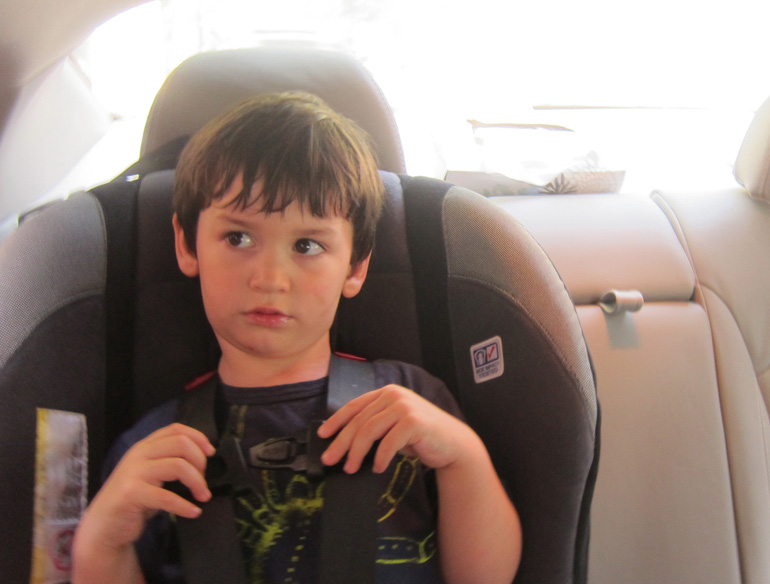Gotham Diary:
Not Wasted
19 August 2013
To all but the last of the haircuts, I would bring Will uptown in a Vital black car, ordered by Kathleen, because you really cannot even dream of finding an empty taxi in Soho at four in the afternoon. He was never more the little gentleman than on these rides. He would sat still, even without a car seat; he would make occasional observations (which, in the early days, I couldn’t much understand) about what he saw out the window. He was always extraordinarily well-behaved, except that it wasn’t behavior, it was just who Will was and is.
He has apparently been very much this ideal traveler on his trip out West, so far at least. Yesterday, his parents crossed a good third of country, driving from the Delaware River to the capital of Wisconsin.
***
In other losses, I finished Necessary Errors over the weekend. The rich and full account of a young American man’s gap year in Prague, twenty-odd years ago, the novel comes to an end on several levels all at once. There is the book itself: you’ve read the last page, and there isn’t any more. Jacob, the young man, is on his way back to the United States, about to open a letter from a lover whom he may never see again. Prague itself has all but completely put socialism behind it, and is waking up every day a Western city, for better or worse. You are still trying to recover from the loss of Melinda, the beautiful Englishwoman who “defects” from her circle of English-teaching expats with an old friend of the hero’s. With only a few pages to go, Jacob shares a letter that he receives from her. Everything ends. For a book about twentysomethings in a time of peace, Necessary Errors is remarkably alert to mortality.
I have never met anyone like Melinda, but I’ve fallen in love with her type over and over again in film: English, university-educated, incapable of uttering a banality, and ravishing to look at. Melinda rather immediately took on the self-possessed glamor of Charlotte Rampling and Saffron Burrows. Her voice, I could tell, had a bottom. And everything that she said was pitch-perfect and true; although gay, Caleb Crain must love the Melindas of the world as much as I do. “You do turn everything to that account, don’t you,” she says when Jacob stammers his belief that the man whom Melinda has been talking about is not gay; she wasn’t talking about sex.
It’s presumably not just for the sex that Melinda leaves her boyfriend and all-but-fiancé, the equally glamorous Rafe, for Carl, a rather good-looking straight friend of Jacob’s who comes to visit and who steals, as it were, the golden apples. The problem between Rafe and Melinda is that Rafe is bored with Prague; he wants to give Kazakhstan a try, and that’s not the direction that Melinda has in mind. (With Carl, she decamps to Rome.) Crain says something outstandingly clever about Rafe.
He had the excitement of a boy looking forward to a math test that has scared all the other boys, not because he’s better at math but because he’s better at thinking while scared.
The conversations that Jacob has with Melinda about her love-life are marvelously Jamesian, shot through with the tacit acknowledgment that to speak too clearly about love is to misunderstand it. As if they understood it! This is a book to read again, after I’ve taught myself Czech.
***
Along with its pleasures, Necessary Errors gave me the opportunity to be honest about something. For the past couple of years — ten, perhaps — I’ve been berating myself for not having had the courage to do something like what Jacob and his friends have done in the novel, to have gone to Europe after college and given living there a try. This complaint is accompanied by the automatic assumption that, had I done so, I should never have returned, because, according to my little reverie, Europe would have suited me so much better. It is all very pretty, this sentimentalized regret. So I needed the good poke in the pants that Necessary Errors gave me. My reason for not going to Europe had nothing to do with a want of courage or resolution. It was all about hating the life of a student. What I dreaded was the prospect of spending a night in a youth hostel — even if only once. Even in those days, I could have said, although it hadn’t occurred to me yet, that my idea of “roughing it” is staying at home. When I travel, I expect room service. No room service, no travel — it’s really that simple. What I want out of travel is an improved version of home; it’s not uncommon for me to have a brainwave about organizing my closets when I’m thousands of miles away from them. Over the weekend, I saw an ad for tourism in Hawaii that showed a young man peering over some boulders at molten lava. “Give your other vacations an inferiority complex,” ran the copy. This way of thinking about travel in particular and about life in general is contemptible to me — in the affectless way that dog food is contemptible.
I also didn’t want to spend any more time around students. The characters in Necessary Errors seem to be normal young people, enjoying their youth. I couldn’t envy them that. Youth was never a good fit on me.

